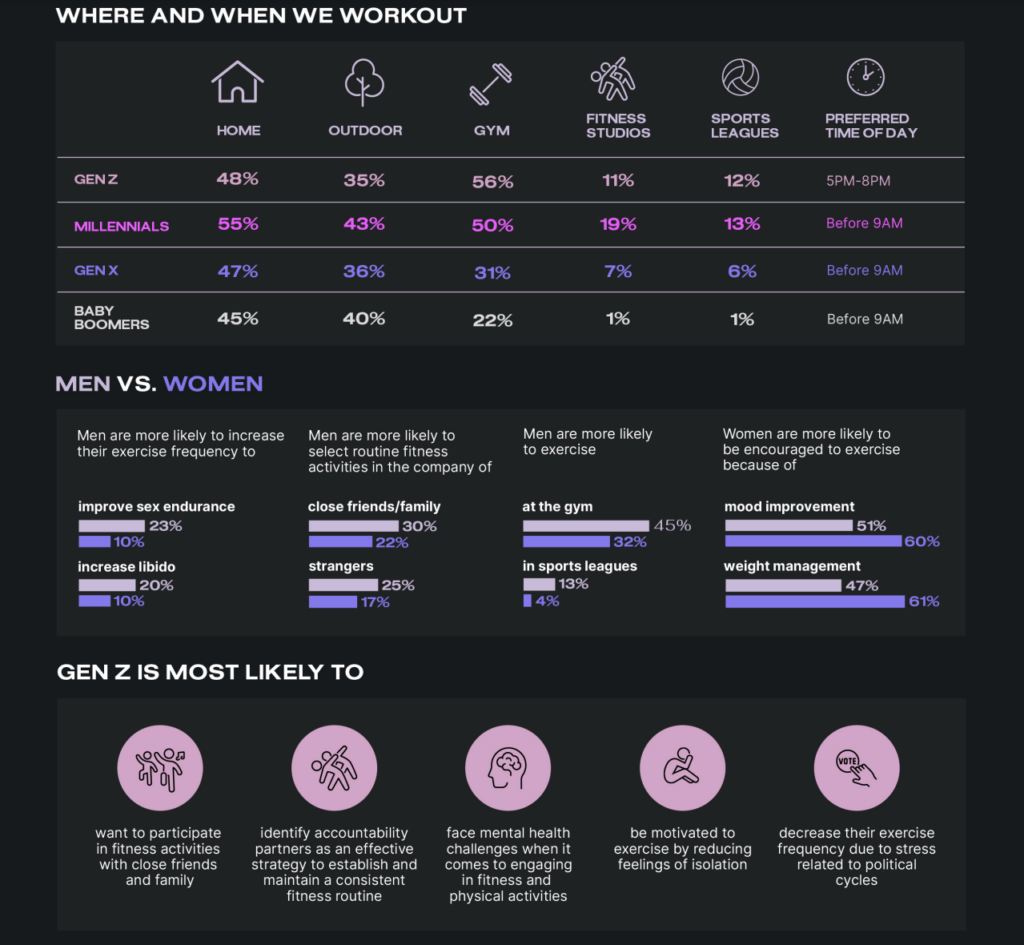
Most consumers believe fitness brands have a responsibility to address barriers to inclusiveness, Peloton finds in a special report
Eight months after a total company rebrand that welcomed new fitness enthusiasts across a variety of demographics, Peloton has released ‘The Peloton Report: A Fitness Journey,’ which unearths what motivates (and hinders) progress, how consumers pursue fitness, what they hope to achieve, and how they use tech on their fitness journey.
Peloton has seen both a rise and fall in recent years, but has continued to endure as the brand that put connected fitness on the map. This year, Peloton fully embraced change as a way to chart a new course, reintroducing its brand with a vision of “anyone, anywhere” fitness that shifted its focus away from hardware and towards its app, inviting everyone to access free fitness content across a variety of modalities.
The revamp occurred this past May, five months after Leslie Berland took over as Peloton’s chief marketing officer. Now, Berland is moving on — leaving her role at Peloton later this month for Verizon.
Under her brief tutelage, Peloton rebranded to become more than a fitness hardware company, leaning into its digital app offerings. At the same time, the brand’s marketing approach morphed from targeting high-income earners in the suburbs to a more inclusive strategy, as seen with its 2023 holiday campaign ad. Peloton also made headway with strategic partnerships, such as Lululemon, Liverpool Football Club, the University of Michigan, New York Road Runners and the NBA and WNBA.

Although the free app tier hasn’t fully hit the mark as far as converting free users into paying subscribers as Peloton initially hoped, CEO Barry McCarthy still deems the strategy a success, noting that Peloton has pulled off somewhat of a feat: continuing to resonate with its core consumers while attracting more male, Gen Z, Black, and Latinx consumers that joined Peloton as both free and paying members.

Peloton’s study consists of data from a U.S.-based online survey taken from Aug. 31 to Sept. 13, 2023, and reveals some key findings regarding the fitness company’s newest users — and offers a glimpse into the minds of Gen Z fitness consumers.
Here are some key insights from “The Peloton Report: A Fitness Journey”:
- Men are more than twice as likely than women to increase their exercise frequency to boost their libido.
- Over two-thirds (66%) of Gen Z reveal that mental factors cause them to increase their exercise, which is more than Gen X (49%) and a quarter more than baby boomers (40%). However, it’s important to note that 79% of Gen Z are more likely to face challenges related to mental factors when trying to engage in fitness (as opposed to 64% of Gen X and 65% of Baby boomers.)
- 56% of Gen Z prefer to work out in a gym or health club setting, eager to be around others.
- Younger generations of fitness consumers are more than two times more likely than Baby boomers to want apps that offer access to fitness instructors to enrich their workout experience.
- 89% of Black/African Americans and 90% of Hispanic/Latinx say they are motivated by the promise of better physical health, and 94% of the Black/African American and 95% Hispanic/Latinx populations say they are motivated by the promise of better mental health.
- While Peloton acknowledges in its report that the fitness industry has work to do, the study revealed 88% of Black/African Americans, 88% of Hispanic/Latinx, and 91% of white Americans believe it is “on par or getting more inclusive.”
- Overall, Peloton found that 68% of the general population believe “people with my background have a positive relationship with fitness” — a statement it found was true across genders, with 72% of men and 64% of women, and races, with 75% of Black/African American respondents, 68% of Hispanic/Latinx respondents, and 66% of white respondents.
- Inclusion is on the minds of fitness consumers, with nearly six in 10 respondents (58%) believing fitness companies and brands have a responsibility to address barriers to inclusiveness.
- 65% of respondents say fitness brands and companies are listening to and taking into account the opinions and needs of their group, with younger generations agreeing more (Gen Z: 71%, Millennials: 78%) than older generations (Gen X: 62%, Baby boomers: 50%).

Download ‘The Peloton Report: A Fitness Journey’ in full here.
